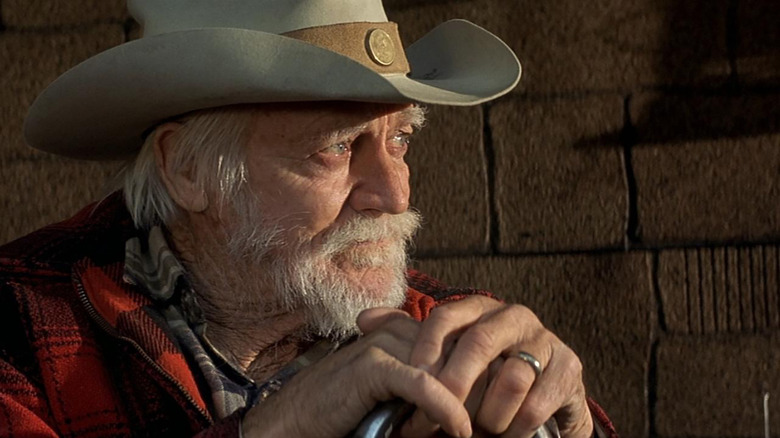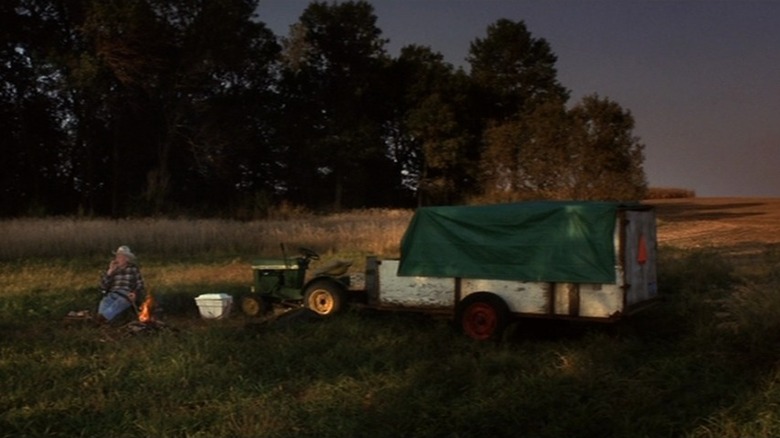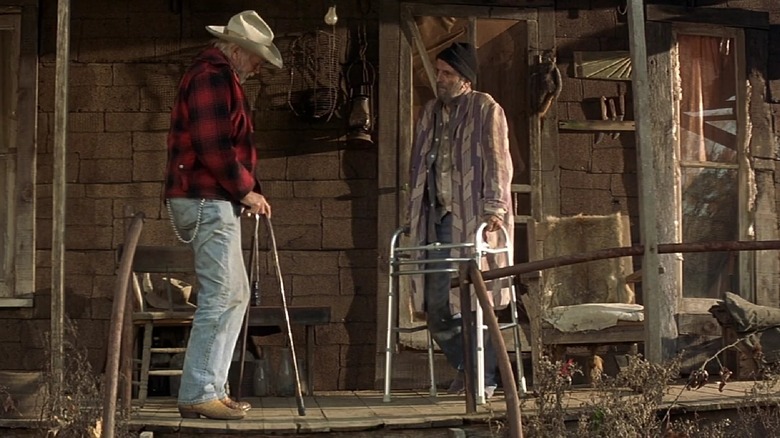That Time David Lynch Made A G-Rated Movie For Disney
The late David Lynch was always best known for his fascination with the grotesque. Although Lynch never considered himself a surrealist, his films often stretched into the surreal, presenting a dark, bent version of reality where only dream logic applies. His debut feature, "Eraserhead," he once described as "a dream of dark and troubling things." Many celebrated his controversial 1986 neo-noir "Blue Velvet," a film that is full of murder, kink, and aggressive sexuality. He deconstructed soap opera dynamics with his somnambulistic TV series (and subsequent feature film version of) "Twin Peaks," went on a lusty crime spree with "Wild at Heart," and made a shadowy contemplation of shifting identities with his porn-inflected 1997 flick "Lost Highway."
Then, in 1999, Lynch did the strangest thing he could have possibly done. He made a G-rated biographical movie for the Disney company.
For "The Straight Story," Lynch eschewed his usual obsessions with sex, death, and violence, and instead made a quiet, slow-moving, incredibly gentle film about an elderly man longing to reconnect with his estranged brother. The film told the true story of Alvin Straight, a 73-year-old Iowa man with a fascinating story to tell. It seems that, in 1994, Alvin's brother Henry suffered a stroke and barely survived. Alvin wanted to go see his brother, but a string of health maladies, as well as bad vision, had taken away his driver's license and prevented him from driving a car. Alvin, undeterred, knew that he could still legally pilot his 1966 John Deere riding lawnmower, a vehicle with a top speed of five miles per hour. He drove his riding mower all the way from Iowa to Blue River, Wisconsin, where Henry lived. The 261-mile trip took Alvin six weeks.
Lynch cast retired actor Richard Farnsworth as Alvin and told a bright, casual, slow-moving story about family, travel, and the American heartland. Despite the material, it's still very much a David Lynch movie.
The Straight Story is rated G, but it's still very much a David Lynch movie
"The Straight Story" is, like the featured riding mower, very slow-paced. Alvin Straight's life isn't full of drama, and his everyday existence isn't very eventful. He lives with his adult daughter Rose (the legendary Sissy Spacek) who dotes on him and has some personal familial drama of her own. Alvin has several friends his age in Iowa, and they playfully give him grief.
Lynch always played a little bit with Disney-like Americana in his films and usually presented a world with an undercurrent of wistful, hayseed corniness. He often deconstructed that picket-fence existence by showing the blood and bugs that lurked under the surface, but one gets the sense that Lynch, a boy from Missoula, Montana, also believed in it to a degree. The gentle, middle America of "The Straight Story" isn't wistful or nostalgic, but it is whimsically honest. The direct thinking of Alvin Straight is, Lynch seems to feel, wholly logical. Although soulful and emotional, "The Straight Story" is also comedic, happily admiring Alvin Straight's weathered resolve.
Case in point: before Alvin sets off on his trip, he aims to buy a grabber from a local store. Alvin walks with two canes and needs a grabber to pick things up off the floor. He asks to buy one belonging to the local shopkeep, who owns two. The shopkeep is reluctant, as he loves both his grabbers. Alvin asks again. The shopkeep demurs more aggressively. Alvin simply keeps on asking until the shopkeep capitulates and releases one of his grabbers into Alvin's care. "What are you going to do with the grabber?" a friend asks. Alvin, without missing a beat, merely says "Grabbin'!"
Despite its simplicity, the scene is one of the funniest Lynch has ever directed.
The Straight Story is about love
The tone of "The Straight Story" is sunny and warm, like the dream you have during a midsummer nap. Gone are the nightmarish weirdos of most of Lynch's oeuvre, and instead are panicked motorists (one is always mortified that she runs into deers on her commute) and friendly barflies. That said, Alvin has a past. He talks a lot about how he and his brother (eventually played by Harry Dean Stanton) are estranged, and how the trip is a vital gesture he must make before they don't have a chance to connect anymore.
In one of the film's more emotional sequences, Alvin is taken to a local Iowa bar and strikes up a conversation with a peer. He has milk — he hasn't had booze in years V and the two old men talk about their experiences in World War II. It wasn't exhilarating or grand for either of them. We understand that Alvin Straight was raised in a time when war trauma was considered something you "just had to get over," and that he is taciturn and "simple" as a psychological defense. He is still, in many ways, deeply wounded.
In this regard, "The Straight Story" is almost an antidote to Disneyana. It vaunts "simple living" like many live-action Disney movies of the 1950s and 1960s, but it isn't nostalgic. Indeed, the past, "The Straight Story" declares, is something that needs to be healed from, overcome, and pushed behind you. "The Straight Story" is about moving forward, however slowly, toward reconciliation, toward healing, toward a final chance. We may slow down in our old age, but there will always be an opportunity to heal.
R.I.P. David Lynch. You took us into so many dark labyrinths, but, for one trip, you drove us through the light.


